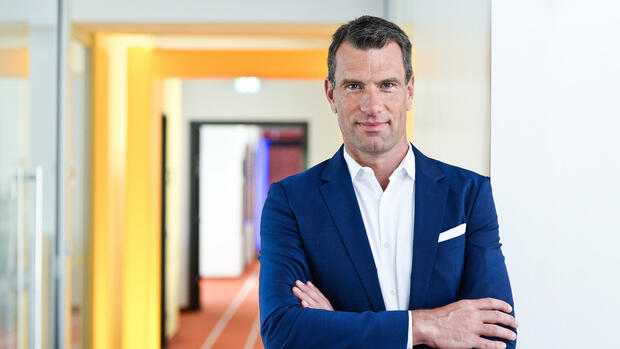The former head of Deutsche Sporthilfe has been Head of Human Resources at Deutsche Bank since 2020.
(Photo: obs)
Frankfurt The head of HR at Deutsche Bank is threatened with sanctions after a securities purchase. Michael Ilgner bought his employer’s bonds worth 201,000 euros on April 18 of this year, a week before the institute’s quarterly figures were published. This emerges from a corresponding message from April 25th.
In doing so, he may have violated the institute’s internal guidelines. Deutsche Bank’s rules prohibit high-ranking managers from trading in the bank’s securities in the eight weeks before the figures are presented. A person familiar with the matter said there was no evidence Ilgner acted maliciously.
After the bank initially did not want to say anything about the process to the financial blog Finanz-szene, the institute published a statement a few hours later in which the bank indicated a possible penalty.
Deutsche Bank has clear rules and controls for personal securities transactions by its employees, it said. “Possible violations of these rules are consistently checked and, if necessary, sanctioned. Regardless of hierarchies, we take these principles very seriously, including in this case,” the bank said. This matter is being examined “holistically” and, if necessary, “the appropriate consequences will be drawn”.
According to a spokesman for Deutsche Bank, Ilgner himself declined to comment. The institute, in turn, refrained from commenting on why it had published the transaction several days later than required by law.
Not a legal problem, but a reputation problem
Securities purchases related to important company releases are considered critical because high-ranking employees often have price-sensitive information in advance. However, unlike stocks, the prices of fixed income securities such as bonds are hardly affected by company results. Therefore, Ilgner’s violation of the rules is probably not legally problematic.
For the bank, however, Ilgner’s insider breakdown poses a potential reputation problem. The institute is said to have let the head of the asset manager subsidiary DWS, Asoka Wöhrmann, who was dismissed last year, go through several strange processes without consequences. For example, the purchase of a Porsche that a business partner of the bank had arranged. Or the use of private e-mails in a professional context.
The lax handling of these incidents is said to have at least contributed to the supposedly voluntary farewell to Vice-Chairman Karl von Rohr. Last year, the bank – like other financial institutions – had to pay a fine in the hundreds of millions because employees had exchanged business matters illegally via messenger apps.
The board members of the bank voluntarily waived EUR 75,000 each of their variable remuneration last year because of these misconduct. Whatapp is said to have been used illegally by very high-ranking managers at the bank, such as DWS.
Sewing had guided Ilgner to Deutsche Bank
The handling of these processes involving Wöhrmann and the Whatsapp affair gave the impression that the bank was reluctant to sanction high-ranking employees.
According to financial circles, the bank is aware of this impression and should therefore think carefully about whether to let Ilgner’s mistake go unpunished – especially since the former head of Sporthilfe is, or at least was, a confidant of CEO Christian Sewing. Sewing had steered Ilgner to Deutsche Bank in 2020, actually with the aim of electing him to the board sooner or later.
>> Read also: Record acquisition – Deutsche Börse wants to take over software company Simcorp
The banking supervisory authority Bafin is said to have refused him the promotion due to a lack of the necessary experience in the banking business. In the meantime, nobody in the bank is talking about Ilgner’s possible promotion to the management board. Since the recent restructuring of the Management Board, he no longer reports to Sewing, but to Rebecca Short, who will also be responsible for Human Resources on the Management Board in the future.
Since Supervisory Board Chairman Alex Wynaendts took office last May, violations of regulations have been sanctioned more severely or at least more publicly. For example, the supervisory board reduced a certain bonus component for all board members by five percent for the past year because, from its point of view, the institute does not make up for the regulatory deficits resolved quickly enough.
More: Deutsche Bank reports highest profit in ten years
